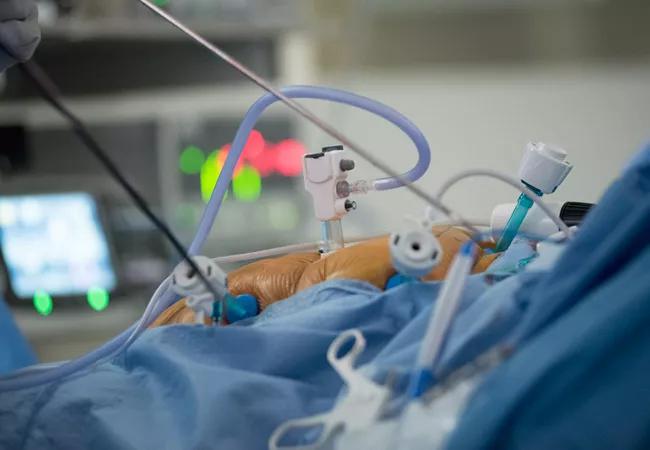Quality and content vary, new research shows

Image content: This image is available to view online.
View image online (https://assets.clevelandclinic.org/transform/14a862e6-ae5d-4765-95e7-f386baf5b3f0/HIPEC_650x450_jpg)
HIPEC_650x450
Every day, people conduct more than 7 million Google searches for health-related information. Some of the information is reliable, some inaccurate or misleading. When patients share this information during a clinical visit, it is up to physicians to educate them and correct any misinformation.
Advertisement
Cleveland Clinic is a non-profit academic medical center. Advertising on our site helps support our mission. We do not endorse non-Cleveland Clinic products or services. Policy
“Every day I see patients who have looked up information on the internet,” says Michael Valente, DO, FACS, FASCRS, a colorectal surgeon in Cleveland Clinic’s Digestive Disease & Surgery Institute. “It’s great that they want to be informed, but the information is often wrong or isn’t applicable to their disease. I have to start over and debunk what they’ve learned.”
Dr. Valente and colleagues see many patients who have searched for information about hyperthermic intraperitoneal chemotherapy (HIPEC), a procedure combining cytoreductive surgery and chemotherapy that is used to treat advanced cancers, including colon and rectal, ovarian, appendix and stomach malignancies that have spread to the peritoneum. Following tumor resection, heated chemotherapy drugs are applied directly inside the abdomen, which enables more targeted, intensive therapy that avoids toxicity.
HIPEC is a specialized, lengthy operation that can extend a patient’s life but also poses risks, such as prolonged intestinal atony and the possibility of a stoma or damage to pelvic or intra-abdominal organs.
Since HIPEC is a relatively uncommon therapy, available only at specialized centers, information about it is more limited than for other procedures and is more likely to be inaccurate. “Patients have very little good knowledge about what we are doing during HIPEC,” says Dr. Valente, who has performed many such procedures.
Previous studies of internet-based information about colorectal conditions, such as colorectal cancer, inflammatory bowel disease and stomas, have found that the most commonly accessed websites are of variable quality and often lack important information about indications for surgery, treatment techniques and complications.
Advertisement
To learn more about internet-based information on HIPEC available to patients, Dr. Valente and colleagues from Cleveland Clinic’s Department of Colorectal Surgery conducted a study that analyzed website quality. Their findings were presented at the American Society of Colon and Rectal Surgeons’ 2022 annual meeting.
The investigators used the three most popular internet search engines (Google, Bing and Yahoo) and entered the key words “HIPEC” and “heated intraperitoneal chemotherapy.” Website quality was analyzed using validated Journal of the American Medical Association (JAMA) benchmark criteria and DISCERN, a tool developed by Oxford University and the British Library.
In addition, the research team, working with surgeon experts in the field, created a novel HIPEC-specific information quality score that represents carefully selected details, including surgical procedures, chemotherapy types, side effects and outcomes.
The first 10 websites produced by each internet search were analyzed and 18 unique websites were identified. The majority (78%) were created by academic institutions. The mean total DISCERN score for all websites was 41.8 +/- 8.4 (maximum possible points 75). The mean JAMA and HIPEC-specific scores were 1.72 +/- 1.13 (maximum possible score 4) and 11.5 +/- 4.5 (maximum possible score 31), respectively.
The lowest JAMA scores were in the category of authorship, with 78% of websites omitting author details. Overall, 89% displayed disclosure/ paid advertiser information.
Advertisement
Regarding the procedure, 83% included the temperature of the chemotherapy and 78% mentioned the duration of HIPEC. A video and/or diagram was provided by 50% of the websites, while only 39% of websites mentioned potential risks and complications of HIPEC, such as anastomotic leaks, small bowel perforations, intra-peritoneal abscesses and fistulas, and cancer recurrence.
“We were surprised that less than half of websites reported complications, especially because it’s such a major operation,” Dr. Valente says. “There is morbidity associated with HIPEC, and hospitalizations can be quite lengthy. It’s made us aware that we need to do a better job at providing information and educating people.”
Since the study’s completion, the Department of Colorectal Surgery has revised the HIPEC information provided on Cleveland Clinic’s website, adding more details.
The department’s clinicians also focus more on patient communication. “I spend more time ensuring that patients have accurate information and discussing survival and outcomes,” Dr. Valente says. “It’s important to be honest up front about HIPEC, without scaring patients. The vast majority of patient decide to undergo the procedure.”
After disseminating the findings, “we hope to work as a team with other centers to help make their websites more informative and useful to patients,” says Dr. Valente.
Advertisement
Advertisement
First-of-its-kind research investigates the viability of standard screening to reduce the burden of late-stage cancer diagnoses
Global R&D efforts expanding first-line and relapse therapy options for patients
Study demonstrates ability to reduce patients’ reliance on phlebotomies to stabilize hematocrit levels
A case study on the value of access to novel therapies through clinical trials
Findings highlight an association between obesity and an increased incidence of moderate-severe disease
Cleveland Clinic Cancer Institute takes multi-faceted approach to increasing clinical trial access 23456
Key learnings from DESTINY trials
Overall survival in patients treated since 2008 is nearly 20% higher than in earlier patients